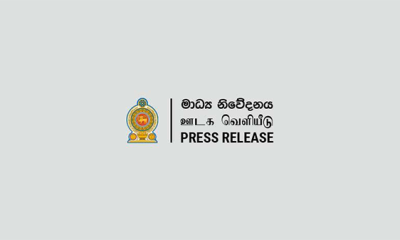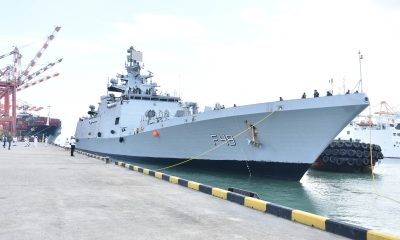Business
Shortage of medicines likely to exacerbate from Paracetamol to life-saving drugs: SLCPI
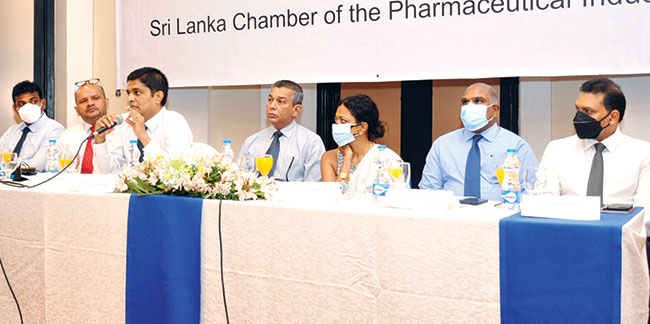
by Sanath Nanayakkare
The current shortage of Paracetamol and Panadol in the market could aggravate to a situation where life-saving drugs would not be available to patients in a few months, Sri Lanka Chamber of the Pharmaceutical Industry (SLCPI) warned yesterday.
“This could happen if the US dollar shortage is not properly addressed and a realistic pricing formula for imported medicines is not introduced forthwith by the authorities,” they said.
“At present, the shortage of medicines is about 5%. One might say it is small or unimportant as to be not worth considering. But in 4-6 weeks from now it could increase to about 25%,” they warned.
SLCPI made these comments at a press briefing held at Taj Samudra Colombo.
“We have a fear. We want to update the general public of Sri Lanka on the current situation with regard to medicine imports because what is on the horizons is not good. Delays at the National Medicines Regulatory Authority (NMRA), the unrealistic price mechanism and the dollar crisis are biting our industry. The dollar crisis is common to every industry, but we also have a serious problem as medicine importers. Until last month, we didn’t have a major crisis. But this month and in the last two weeks, the banks have been advised to prioritise allocation of dollars for fuel purchases and it appears that medicine imports have received de-prioritisation on the list of essential imports. If this trend continues, we will have a serious problem in even importing life-saving drugs. At the moment, it is under control. We have to inform the general public of the evolving situation,” Azam Jaward, Vice President, SLCPI said.
“The last price increase on drugs was allowed in August 2021 when the USD was trading at Rs. 194. Now the dollar has incresed to Rs. 203 which is the ‘published rate’ by the Central Bank of Sri Lanka, but unfortunately there is no mechanism to address the current disparity in the exchange rate. We need asustainable pricing mechanism which addresses the exchange rate, freight rate, current global prices, inflation, cost of fuel etc,” they said.
“Our industry is quite energy-driven. Some drugs need to be stored in temperatures between 2- 8 Celsius. Some need -20 Celsius. If we don’t have electricity, we face big issues. We have to run generators and multiple storage facilities. At present, we are managing it. But all of this depends on the availability of fuel. To run a generator for 7-8 hours a day, we need 2,000 litres of diesel per day,” they said.
“The NMRA charges dollars from us to register a product. They adjust it monthly based on the change of the exchange rate. The government has a fee- charging mechanism based on the US dollar. Then why don’t they do the same for drugs that are imported for sale? These are two conflicting policies,” they argued.
“We don’t need a price increase. Just amend the prices relative to the value of the dollar. For this we need an intervention by the Central Bank. If we can obtain a monthly allocation of USD 25-30 million per month, we believe that we can supply essential drugs to the general public without any disruption,” they said.
“We have had discussions with the authorities on these matters and we have submitted these facts for them to consider, but we have not yet achieved any results other than discussions.There is undue delay at the NMRA in granting the re-registration of products which have been available in the market for a considerable period, and new product registrations. With regulatory fees increasing by an average of 11-fold, the service of the regulator is below expectation,” they said.
Some excerpts of the SLCPI press statement are reproduced below.
“Over 85% of pharmaceutical products are imported, and these imports are paid for by US dollars. The current US dollar shortage in the country has increased the difficulty of importing essential medicines. In addition to this, companies have been unable to pay their dues. As a result, suppliers are no longer interested in supplying to Sri Lanka.”
“The situation is further worsened as banks find it difficult to honour the Letters of Credit (LCs) that are opened to import drugs. Banks delay opening the LCs until there are sufficient dollars. This has resulted in shipments being scheduled according to the availability of dollars and not according to the needs of the patients.”
acceptable pricing mechanism as well as immediately ironing out NMRA red tape for registrations are prerequisites for resolving this crisis.”
SLCPI serves as the representative of over 60 members who account for more than 80% of the private pharmaceutical industry, spanning manufacturers, importers, distributors and retailers. These stakeholders supply Sri Lankan patients with 1,200 molecules from 435 manufacturers from across the world.
SLCPI told The Island that banks ask them to purchase dollars from exporters to finance their medicine imports, but when they reach exporters to buy their dollars, they ask Rs. 245 per US dollar which is the price in the gray market. “So, how can we buy dollars from them and import and sell at controlled prices?” they said.
Business
Industry and Entrepreneurship Development Minister Handunneththi’s visit to Lumala highlights key industrial concerns
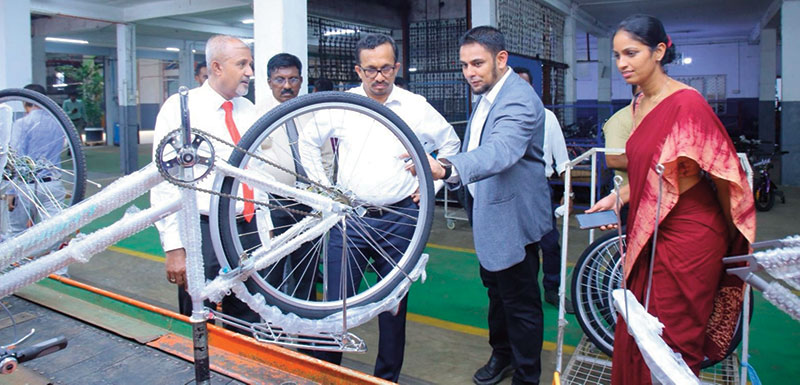
With the aim of assesing the current challenges faced by local industrialists and explore avenues for government support, Minister of Industry and Entrepreneurship Development Hon. Sunil Handunneththi visited City Cycle Industries Manufacturing (Pvt.) Ltd., widely known as Lumala, on March 24 at its factory in Panadura.
During the visit, Minister Handunneththi engaged with senior officials and employees to understand their concerns and operational difficulties. In a statement shared on social media, the Minister acknowledged the pressing challenges affecting Sri Lanka’s manufacturing sector and emphasized the government’s commitment to providing swift and effective solutions.
Minister Handunneththi further reiterated the government’s intent to position local manufacturers as key stakeholders in Sri Lanka’s economy by addressing regulatory hurdles, market imbalances, and supply chain constraints.
The visit comes amid growing concerns from Lumala employees and management regarding the state of Sri Lanka’s bicycle manufacturing industry, in the backdrop of facing significant challenges, including an influx of imported bicycles and components that circumvent regulatory checks. In addition, the high taxes on raw materials used in local manufacturing has further exacerbated production costs, making it difficult for domestic manufacturers to remain competitive.
Earlier this year, Lumala employees called for urgent government intervention to address these challenges, warning that ongoing financial strain could lead to further shutdowns of critical production units, job losses, and setbacks to the broader industrial ecosystem. With a local value addition of 50-70 percent verified by the Ministry, its workforce remains hopeful that government action will help achieve an ethical manufacturing industry.
Lumala, a household name in Sri Lanka’s bicycle industry, has been a key player in sustainable mobility solutions for over 35 years. The company was recently honored with the Best National Industry Brand award under the Large-Scale Other Industry Sector category at the National Industry Brand Excellence Awards 2024.
With a production capacity of 2,000 bicycles per day and a workforce of 200, Lumala continues to cater to both domestic and international markets, producing a diverse range of bicycles, electric bikes and light electric vehicles. In line with Sri Lanka’s goal to expand forest cover to 32 percent by 2030 and cut GHG emissions by 14.5%, Lumala is actively contributing to this mission—both as a company and through its diverse range of products.
As Sri Lanka works towards strengthening its local manufacturing sector, Minister Handunneththi’s visit signals a crucial step toward addressing industrial concerns and reinforcing government support for sustainable and competitive domestic production.
Business
New SL Sovereign Bonds win foreign investor confidence
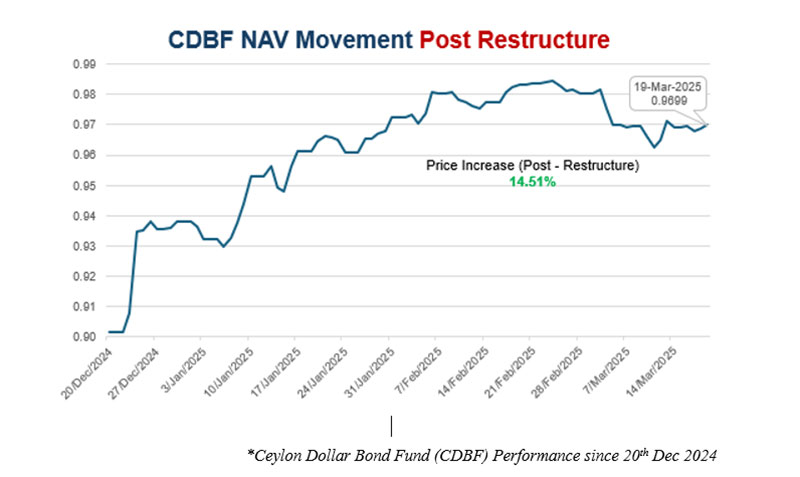
Sri Lanka’s country rating was upgraded from ‘Restricted Default’ to ‘CCC’ following the successful exchange for the new International Sovreign Bonds (SL ISBs) during December 2024. The three types (03) of exciting new sovereign bonds have restored foreign investor confidence.
The Central Bank of Sri Lanka (CBSL) has performed a remarkable role in guiding the economy out of default status and restored economic stability, and gained Sri Lanka a non-default Country Rating of ‘CCC’. Among the key achievements of CBSL, have been to reduce treasury interest rates under 9% and stabilize the currency while rebuilding foreign reserves to $ 6Bn.
SL offers four Macro Linked Bonds (MLBs) linked to GDP growth, a Governance Linked Bond (GLB) and a short term, Fixed Coupon Bond for unpaid Past Due Interest (PDI). The MLBs offer variable returns depending on SL’s GDP growth from 2024 to 2027, (e.g. haircuts can vary between 16% to 39%). The GLB interest can vary depending on meeting 15.3% and 15.4% of Total Revenue/ GDP thresholds in 2026 and 2027 respectively. The PDI bond offers a fixed coupon of 4% until 2028 and trades at around $94.
This combination of unique, variable returns offers global investors an exciting opportunity to capitalize on SL’s economic revival and US interest rate movements. Sri Lanka’s economic resurgence in 2024 was promising, with a 5% GDP growth rate. With improving investor confidence, SL ISB daily turnover now exceeds $10mn.
The Ceylon Dollar Bond Fund (CDBF) is the only USD Sovereign Bond Fund that is exclusively invested in SL ISBs with Deutsche Bank acting as the Trustee and Custodian Bank. The Fund reported returns of 53% in 2023 and 39% in 2024.
We invite foreign investors to enter CDBF while Sri Lanka is rated at ‘CCC’ and consider realizing their investment upon SL reaching a Country Rating of ‘B- ‘. Other advantages of CDBF are, the ability to withdraw anytime and being tax exempted.
Ceylon Asset Management (CAM), the Fund Manager, has commenced an advertising campaign to promote the CDBF to the Sri Lankan Diaspora, South Asian, Middle Eastern and Australian Investors. CAM is an Associate Company of Sri Lanka Insurance Corporation (SLIC) and licensed under the Securities and Exchange Commission of Sri Lanka Act, No. 19 of 2021.
Meanwhile, the Ceylon Financial Sector Fund managed by CAM emerged as the top performing rupee fund in Sri Lanka during 2024, with a return of 64%. Investors can find out more on www.ceylonassetmanagement.com or write to us on info@ceylonam.com.
Past performance is not an indicator of the future performance. Investors are advised to read and understand the contents of the KIID on www.ceylonam.com before investing. Among others investors shall consider the fees and charges involved.(CAM)
Business
Share market plunges steeply for second consecutive day in reaction to US tariffs

CSE plunged at open, falling for the second consecutive day yesterday, down over 300 points in mid- morning trade.US President Donald Trump has imposed a 44 percent tax on Sri Lanka’s exports in an executive order which he claimed, spelt out discounted reciprocal rates for about half the taxes and barriers imposed by the island on America.
As a result both indices showed a downward trend. The All Share Price Index dropped 300 points, or 2.32 percent, to 15,294.94, while the S&P SL20 dropped 101 points, or 2.71 percent, to 4,517.37.
Turnover stood at Rs 3.1 billion with six crossings. Those crossings were reported in Sampath Bank which crossed 1.6 million shares to the tune of Rs 181 million and its shares traded at 109, JKH 4.1 million shares crossed to the tune of 80.5 million and its shares sold at Rs 19.5.
Hemas Holdings 400,000 shares crossed for Rs 45.6 million; its shares traded at Rs 114, CTC 25000 shares crossed to the tune of Rs 32.2 million; its shares traded at Rs 1330, Commercial Bank 200,000 shares crossed for 27 million; its shares traded at Rs 135 and TJ Lanka 157,000 shares crossed for Rs 20 million; its shares traded at Rs 46.
In the retail market top six companies that have mainly contributed to the turnover were; Sampath Bank Rs 296 million (2.9 million shares traded), JKH Rs 220 million (11.2 million shares traded), Haylays Rs 195 million (142,000 shares traded), HNB Rs 151 million (519,000 shares traded), Commercial Bank Rs 138 million (1 million shares traded) and Central Finance Rs 129 million (735,000 shares traded). During the day 218 million shares volumes changed hands in 22000 transactions.
It is said the banking sector was the main contributor to the turnover, especially Sampath Bank, while manufacturing sector, especially JKH, was the second largest contributor.
Yesterday, the rupee opened at Rs 296.75/90 to the US dollar in the spot market, stronger from Rs 296.90/297.20 on the previous day, dealers said, while bond yields were up.
A bond maturing on 15.10.2028 was quoted at 10.35/40 percent, up from 10.25/30 percent.
A bond maturing on 15.09.2029 was quoted at 10.50/60 percent, up from 10.45/55 percent.
A bond maturing on 15.10.2030 was quoted at 10.60/70 percent, up from 10.30/65 percent.
By Hiran H Senewiratne
-

 Business2 days ago
Business2 days agoStrengthening SDG integration into provincial planning and development process
-

 News6 days ago
News6 days agoBid to include genocide allegation against Sri Lanka in Canada’s school curriculum thwarted
-

 Sports7 days ago
Sports7 days agoSri Lanka’s eternal search for the elusive all-rounder
-

 Business17 hours ago
Business17 hours agoNew SL Sovereign Bonds win foreign investor confidence
-

 Sports3 days ago
Sports3 days agoTo play or not to play is Richmond’s decision
-

 News7 days ago
News7 days agoComBank crowned Global Finance Best SME Bank in Sri Lanka for 3rd successive year
-

 Features7 days ago
Features7 days agoSanctions by The Unpunished
-

 Features7 days ago
Features7 days agoMore parliamentary giants I was privileged to know


